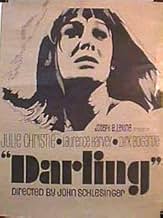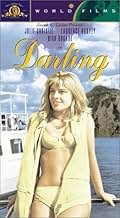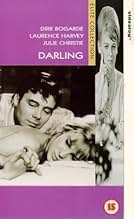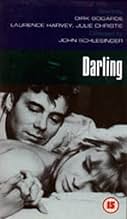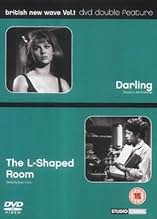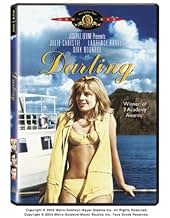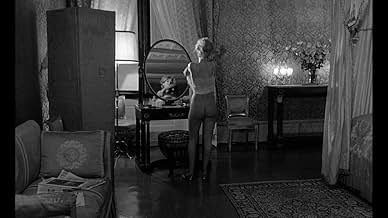VALUTAZIONE IMDb
7,0/10
8382
LA TUA VALUTAZIONE
Giovane, attraente e vivace, la modella Diana Scott è decisa a diventare ricca e famosa. Per avere successo, non esita a fare passi coraggiosi.Giovane, attraente e vivace, la modella Diana Scott è decisa a diventare ricca e famosa. Per avere successo, non esita a fare passi coraggiosi.Giovane, attraente e vivace, la modella Diana Scott è decisa a diventare ricca e famosa. Per avere successo, non esita a fare passi coraggiosi.
- Regia
- Sceneggiatura
- Star
- Vincitore di 3 Oscar
- 17 vittorie e 8 candidature totali
José Luis de Vilallonga
- Prince Cesare della Romita
- (as Jose Luis De Vilallonga)
T.R. Bowen
- Tony Bridges
- (as Trevor Bowen)
Recensioni in evidenza
This is a breakthrough film depicting what a female with a fairy tale-like upbringing experiences when she gets into the real world. Julie Christie is magnificent as the free-spirited, swinging role model for women everywhere. She has men falling right and left for her and even promises of wealth beyond imagination. But her unfulfilment is perfectly depicted in this daring and innovative film. She falls for a famous dashing tele-journalist, but realises soon enough that she is no match for his brain. She falls for a slick and smarmy executive, hoping to find her place with the jet set. She sees the shallowness of that existence soon enough! She does eventually find some taste of fame and is swept away to Capri, one of the most romantic and beautiful spots in the world. But there she sees only the shallow reflection of her outer beauty when confronted with the deeper beauty of elderly women praying with grace and humility at a local church. She does also manage to meet a prince who wants to marry her. He gives her wealth, a title, an enormous glamourous estate, a tailor-made family (from a previous marriage) and his deepest admiration. Unfortunately, his admiration is no more deep for her than it might be for his prize horse or Rolls Royce. She has everything but love.
The film has much to say about the illusions of glamour that women are compelled to fulfil. They are compelled to fulfil those illusions because they never had an inkling that there could be anything else. Women could rub shoulders (and other body parts) with men of brilliance, of power, and of wealth, but their own surface existence could never be a match. The film is essentially a tragi-comedy, for beneath the delightful exterior of the film is the harsh reality that a surface life is no match for a life with purpose.
This film is also amazing because it is one of the few films that actually shows characters living in a real world, not just a world that revolves around the characters. Schlesinger fills the screen with a myriad of realities. The man on the street pontificating his views on city life, a famous author, celebrities, bohemians, a gay photographer who is not traumatised about what he is, and even that great symbol of solid innocence - the elderly woman feeding the pigeons at Picadilly Circus, they are all essentially equal in importance. We in fact are mainly introduced to Christie's character as she is plucked out of the street in an indiscriminate interview. She is much a product of the world as anyone else.
The film is still timely today, since there are still so many women who cling to the images and myths of ideal womanhood (ie: an illusion without soul or intelligence). All the performances are smashing. And yes, it is true, that swinging sixties feel is irresistible!
The film has much to say about the illusions of glamour that women are compelled to fulfil. They are compelled to fulfil those illusions because they never had an inkling that there could be anything else. Women could rub shoulders (and other body parts) with men of brilliance, of power, and of wealth, but their own surface existence could never be a match. The film is essentially a tragi-comedy, for beneath the delightful exterior of the film is the harsh reality that a surface life is no match for a life with purpose.
This film is also amazing because it is one of the few films that actually shows characters living in a real world, not just a world that revolves around the characters. Schlesinger fills the screen with a myriad of realities. The man on the street pontificating his views on city life, a famous author, celebrities, bohemians, a gay photographer who is not traumatised about what he is, and even that great symbol of solid innocence - the elderly woman feeding the pigeons at Picadilly Circus, they are all essentially equal in importance. We in fact are mainly introduced to Christie's character as she is plucked out of the street in an indiscriminate interview. She is much a product of the world as anyone else.
The film is still timely today, since there are still so many women who cling to the images and myths of ideal womanhood (ie: an illusion without soul or intelligence). All the performances are smashing. And yes, it is true, that swinging sixties feel is irresistible!
I had not seen this film since 1965 when I was a college student but remember how electrifying it was to see a young, charismatic Julie Christie at the beginning of her peak years. She's given some great scenes to show off her multi-faceted personality and she throws herself into the amoral model, Diana, who sleeps her way to the top. I can't imagine any other actress who could have done this without being repulsed by her naked greed and amorality. Christie had an inner radiance that makes her likable throughout this ground-setting import from London. England had become a hot movie center during this era, giving us such phenomenal movies like "Georgy Girl," "women in love," "Isadora," and many more. We can see this movie as a time machine which captures the raw energy of that era as our sexuality began to expand into new realms from the staid values of the past. This is a terrific movie to watch from time to time and watch an early phenomenon begin her golden career.
Darling (1965)
A black and white, Mod London romance and its aftermath, over and over, with all the tumult and glitz of the times. The events race forward and create a real tornado of activity, centering around one woman, Diana Scott, who is perfectly played by Julie Christie. Diana is as charming and beautiful as the actress who plays her, and she is drawn to men, to the movies, to modeling, and generally to success and ruin, up and down, in a wild ride.
British movies had a vigorous neo-realism (British New Wave) movement in the late 50s and early 60s, and by the time of this film it had segued into a purely celebratory pop mode, cashing in on the times, and the British Invasion in music. "Darling" is kind of in both worlds, I think, the same way the 1964 "A Hard Days Night" is in both, though they are very different films. But there is a frankness to the filming that belies the (at first) entertaining and largely fictional subject. And unlike the earlier neo-real innovators ("Loneliness of a Long Distance Runner" etc.), the focus here is on a privileged class, and on the rising fortunes of Diana as she moves from one relationship to another.
The filming gives these seemingly flighty, alternately glib and sad events a somberness they need. Director John Schlesinger was a British New Wave upstart, and would later do the American masterpiece "Midnight Cowboy," which might be said to have the same mixture of inventive fiction and believable raw realism.
Diana is a superficial woman who cashes in on her good looks and fun temperament, and her many men never seem to mind at first. She leads, but she also get towed along, falling in love, never seeming to be quite as happy as she should. Indeed, the movie begins with her explaining through a voice-over her inner yearning for what matters in life, since it's so hard to otherwise tell. Toward the end, in Italy (after England and France had been exhausted), she says to her newest man, "If I could just feel complete." And she means it. But then, in the next scenes, she's having fun again, telling lies and losing her bearings.
Christie is a marvel, really, even though you might just say she's playing herself (though not acting out the events in her life, we hope). This is her breakout film (along with her next film, "Dr. Zhivago"), and she really does typify the Mod English girl, fresh and carefree. There is even a very brief nude shot, from behind, that is a sign of mid-60s liberation in both life and in filmmaking. Dirk Bogarde is certainly excellent, too, and subtle, and indeed the whole cast is first rate, maybe because everyone is playing their contemporary selves with fictional names.
So the movie is terrific, even if it sometimes seems to keep meandering through the paces over the whole two hours. It wraps you in its world. Inevitably the outcome is as somber as the greys of the filming. What else would happen to someone who can't find love, or happiness, or meaning? It's impossible to really feel complete, as a person, if you search outside yourself too much, and hers is a superficial world of her own making, Diana is a superficial woman with lots of unexplored depth.
The writing here is totally first rate, the filming is first rate, the editing and pace first rate. It's simply a well made movie about a contemporary dilemma. "Thank God it's never too late," she says at the end, and in fact you know that she should really say, "God, everything stays the same." I don't think there is meant to be an echo here of Grace Kelly in particular, but there is a similar arc to Diana's career (and her name, of course, predicts a later Princess Diana). Diana's apparent sexual freedom is laden with that old convention of marriage (which she early on wisely says she doesn't want) and so some extent she can be a freewheeling young woman partly because she is always taken care of, and increasingly so. An interesting take on whether this is an accurate picture at all of the times is in this short apolitical article: www.socialistreview.org.uk/article.php?articlenumber=10813.
This movie ranks, for me, almost up there with "Alfie" and "Georgie Girl" (two of my favorites) as a look at the times in England. Honest, sometimes disturbing, and artistically considered. Don't miss it.
A black and white, Mod London romance and its aftermath, over and over, with all the tumult and glitz of the times. The events race forward and create a real tornado of activity, centering around one woman, Diana Scott, who is perfectly played by Julie Christie. Diana is as charming and beautiful as the actress who plays her, and she is drawn to men, to the movies, to modeling, and generally to success and ruin, up and down, in a wild ride.
British movies had a vigorous neo-realism (British New Wave) movement in the late 50s and early 60s, and by the time of this film it had segued into a purely celebratory pop mode, cashing in on the times, and the British Invasion in music. "Darling" is kind of in both worlds, I think, the same way the 1964 "A Hard Days Night" is in both, though they are very different films. But there is a frankness to the filming that belies the (at first) entertaining and largely fictional subject. And unlike the earlier neo-real innovators ("Loneliness of a Long Distance Runner" etc.), the focus here is on a privileged class, and on the rising fortunes of Diana as she moves from one relationship to another.
The filming gives these seemingly flighty, alternately glib and sad events a somberness they need. Director John Schlesinger was a British New Wave upstart, and would later do the American masterpiece "Midnight Cowboy," which might be said to have the same mixture of inventive fiction and believable raw realism.
Diana is a superficial woman who cashes in on her good looks and fun temperament, and her many men never seem to mind at first. She leads, but she also get towed along, falling in love, never seeming to be quite as happy as she should. Indeed, the movie begins with her explaining through a voice-over her inner yearning for what matters in life, since it's so hard to otherwise tell. Toward the end, in Italy (after England and France had been exhausted), she says to her newest man, "If I could just feel complete." And she means it. But then, in the next scenes, she's having fun again, telling lies and losing her bearings.
Christie is a marvel, really, even though you might just say she's playing herself (though not acting out the events in her life, we hope). This is her breakout film (along with her next film, "Dr. Zhivago"), and she really does typify the Mod English girl, fresh and carefree. There is even a very brief nude shot, from behind, that is a sign of mid-60s liberation in both life and in filmmaking. Dirk Bogarde is certainly excellent, too, and subtle, and indeed the whole cast is first rate, maybe because everyone is playing their contemporary selves with fictional names.
So the movie is terrific, even if it sometimes seems to keep meandering through the paces over the whole two hours. It wraps you in its world. Inevitably the outcome is as somber as the greys of the filming. What else would happen to someone who can't find love, or happiness, or meaning? It's impossible to really feel complete, as a person, if you search outside yourself too much, and hers is a superficial world of her own making, Diana is a superficial woman with lots of unexplored depth.
The writing here is totally first rate, the filming is first rate, the editing and pace first rate. It's simply a well made movie about a contemporary dilemma. "Thank God it's never too late," she says at the end, and in fact you know that she should really say, "God, everything stays the same." I don't think there is meant to be an echo here of Grace Kelly in particular, but there is a similar arc to Diana's career (and her name, of course, predicts a later Princess Diana). Diana's apparent sexual freedom is laden with that old convention of marriage (which she early on wisely says she doesn't want) and so some extent she can be a freewheeling young woman partly because she is always taken care of, and increasingly so. An interesting take on whether this is an accurate picture at all of the times is in this short apolitical article: www.socialistreview.org.uk/article.php?articlenumber=10813.
This movie ranks, for me, almost up there with "Alfie" and "Georgie Girl" (two of my favorites) as a look at the times in England. Honest, sometimes disturbing, and artistically considered. Don't miss it.
To see this 60's landmark film is quite something. In many ways could be considered a period piece and at the same time it could have been conceived yesterday. Julie Christie's performance is the insurance "Darling" has to ensure its powerful sailing through the years into the forever ever. She is extraordinary! Schlesinger lets himself be guided by something other than his British restrain and fear of sentimentality here. He is tough and poetic telling us the story of Diana Scott (could had been Lady Diana Spencer to a T) with understanding and compassion but without trying to make her a sympathetic character. Julie Christie takes care of that in what, time will tell, in fact is already telling us, one of the best performances on film, ever.
Darling is known generally as an iconic "Sixties" movie. It is at once a product of its time and a still-born anachronism. Though conceived and shot in 1964-65, there is nary a hint of the Beatles and their ilk, who by the time this film went in front of the cameras were unquestionably the major pop cultural phenomenon on earth, and certainly in Britain where this story takes place. The characters who parade before us in this slickly packaged satire are far more evocative of the earlier "La Dolce Vita" period. Perhaps the newly emerging youthful counterculture is absent because the groupings visited here are, in contrast to the many- millioned teenage Beatles fans, older, more rarefied and further up the social ladder in corporate boardrooms, haute-couture industry gatherings, mainstream television production units, the profit-driven B-movie exploitation industry, and the haunts of continental royalty. Sparkling and memorable as it is, the musical scoring by John Dankworth was also dated by mid-1965 when this film came out.
The satire is often from the finger-pointing, underscoring school. Best example: A portly dowager in furs at a charity function stuffs an hors d'oeuvre into her mouth with a bejeweled hand as a speaker pompously thanks those present for fighting the scourge of hunger in the world.
Screenwriter Frederic Raphael and director John Schlesinger organize their material in semi- documentary fashion with voice-over narration by the title character, Diana Scott (Julie Christie) in order to reveal her hypocrisy as she describes various episodes in her life while the unfolding screen actions ironically contradict her words. She portrays herself verbally as innocent, sensible and basically decent when in fact she's selfish, dishonest and miserable. The underlying causes of her selfishness, dishonesty and misery are neither explained nor explored, but she is presented in a way that encourages us to regard her as a micro-consequence of the crass, materialistic, soulless macro-society around her. The episodes in her bumpy road to despair succeed one another briskly enough to keep us diverted and shaking our heads at the imperfect human types on display. The arc of the story takes Diana higher and higher on the material plane until she can rise no more, only to find emptiness at the top. The point seems to be "looks, money and prestige aren't everything – but look how entertainingly we're presenting that platitude."
This film and Doctor Zhivago, released shortly after, made Julie Christie the most honored and publicized actress in the world for about a year and it's interesting to compare her Diana Scott with her Lara character in David Lean's epic. Lean, a stern and experienced taskmaster, got more solid acting out of her. Schlesinger's grip is looser, resulting in a more uninhibited but less disciplined performance. As one flavor of the media-created "It" girls of the Sixties (Ann Margret, Twiggy, Goldie Hawn being other flavors) she embodied a certain attitude toward life that was in the air in the industrialized world in those days, an informality of demeanor which some would call proletarian or others would call "beatnik"; hers was a looser, more naturalistic look, a beauty outside the parlor. Julie Christie was beautiful without a speck of makeup while the wind was blowing her hair in four different directions and seemed to be an entirely different person depending on which angle she presented to the camera or what kind of light was bouncing off her partly chiseled, partly soft and sensuous features. Her very presence lent a depth that may not have been written into the character. With another actress, one can only wonder how effective this film would have been. Her chief fellow players, Laurence Harvey and Dirk Bogarde, give splendid support, as does the rest of the cast. But the spotlight is definitely on Julie; it is her showcase.
The satire is often from the finger-pointing, underscoring school. Best example: A portly dowager in furs at a charity function stuffs an hors d'oeuvre into her mouth with a bejeweled hand as a speaker pompously thanks those present for fighting the scourge of hunger in the world.
Screenwriter Frederic Raphael and director John Schlesinger organize their material in semi- documentary fashion with voice-over narration by the title character, Diana Scott (Julie Christie) in order to reveal her hypocrisy as she describes various episodes in her life while the unfolding screen actions ironically contradict her words. She portrays herself verbally as innocent, sensible and basically decent when in fact she's selfish, dishonest and miserable. The underlying causes of her selfishness, dishonesty and misery are neither explained nor explored, but she is presented in a way that encourages us to regard her as a micro-consequence of the crass, materialistic, soulless macro-society around her. The episodes in her bumpy road to despair succeed one another briskly enough to keep us diverted and shaking our heads at the imperfect human types on display. The arc of the story takes Diana higher and higher on the material plane until she can rise no more, only to find emptiness at the top. The point seems to be "looks, money and prestige aren't everything – but look how entertainingly we're presenting that platitude."
This film and Doctor Zhivago, released shortly after, made Julie Christie the most honored and publicized actress in the world for about a year and it's interesting to compare her Diana Scott with her Lara character in David Lean's epic. Lean, a stern and experienced taskmaster, got more solid acting out of her. Schlesinger's grip is looser, resulting in a more uninhibited but less disciplined performance. As one flavor of the media-created "It" girls of the Sixties (Ann Margret, Twiggy, Goldie Hawn being other flavors) she embodied a certain attitude toward life that was in the air in the industrialized world in those days, an informality of demeanor which some would call proletarian or others would call "beatnik"; hers was a looser, more naturalistic look, a beauty outside the parlor. Julie Christie was beautiful without a speck of makeup while the wind was blowing her hair in four different directions and seemed to be an entirely different person depending on which angle she presented to the camera or what kind of light was bouncing off her partly chiseled, partly soft and sensuous features. Her very presence lent a depth that may not have been written into the character. With another actress, one can only wonder how effective this film would have been. Her chief fellow players, Laurence Harvey and Dirk Bogarde, give splendid support, as does the rest of the cast. But the spotlight is definitely on Julie; it is her showcase.
Lo sapevi?
- QuizThe "vox pop" TV interviews conducted by Dirk Bogarde's character with people in the street were all done with genuine members of the public, not actors, and were not scripted.
- BlooperWhen Diana and Robert quarrel and he leaves the apartment they share together, a microphone is visible on the left of the scene.
- Citazioni
Diana Scott: Taxi!
Robert Gold: We're not taking a taxi.
Diana Scott: Why not?
Robert Gold: I don't take whores in taxis.
Diana Scott: What do mean?
Robert Gold: That's what you are isn't it? A little whore! Isn't it?
- Versioni alternativeThe original UK cinema version was cut by the the BBFC to remove shots of a man wearing a woman's corset and to heavily shorten a scene at a party in Paris where guests watch a couple making love on a hotel bed (the scene was edited to end the scene before the male partner appears). Video versions featured the same print though the cuts were later found and restored for the 2007 Optimum DVD release.
- ConnessioniFeatured in Film Review: Julie Christie & John Schlesinger (1967)
I più visti
Accedi per valutare e creare un elenco di titoli salvati per ottenere consigli personalizzati
- How long is Darling?Powered by Alexa
Dettagli
Botteghino
- Budget
- 400.000 £ (previsto)
- Lordo in tutto il mondo
- 25.444 USD
- Tempo di esecuzione2 ore 8 minuti
- Colore
Contribuisci a questa pagina
Suggerisci una modifica o aggiungi i contenuti mancanti



